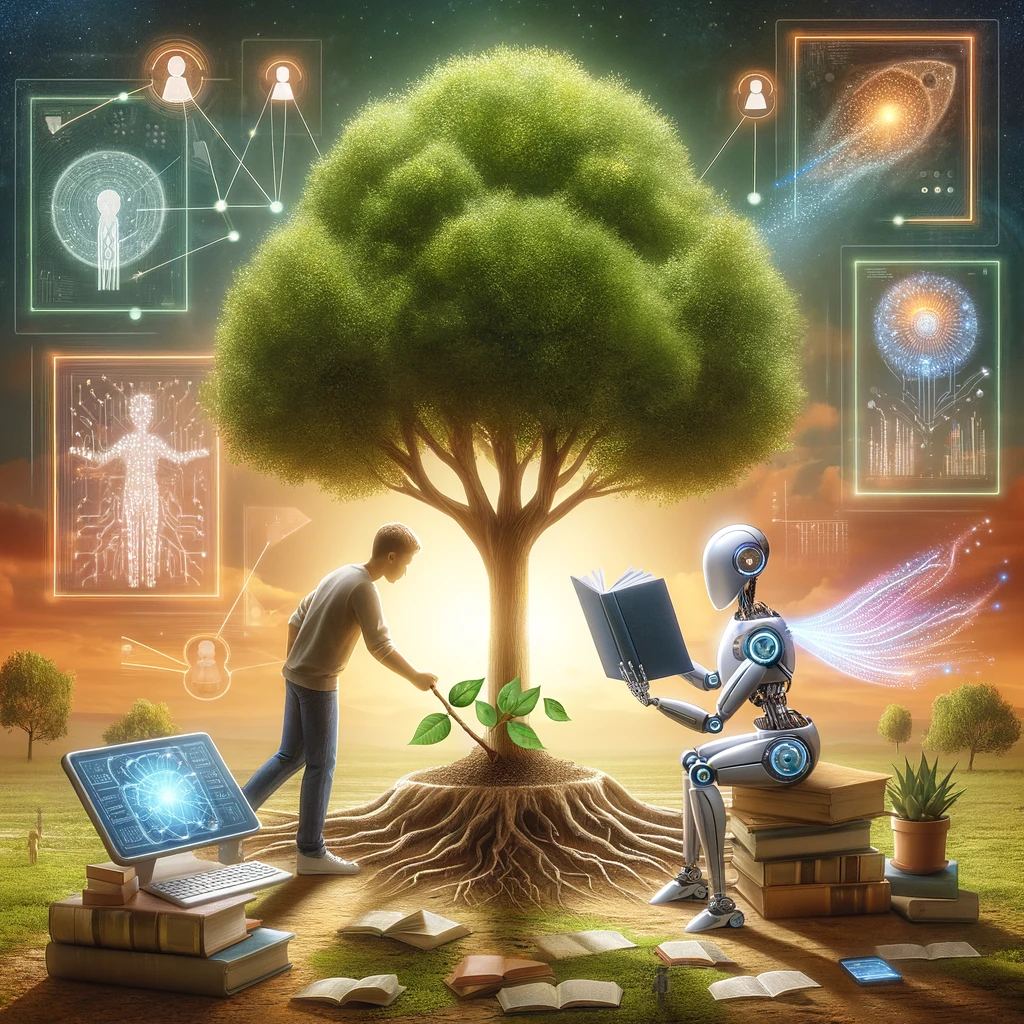I’ve been a subscriber to the Obsidian Publish service for a while now, and the idea of learning publicly sounds appealing. Plus, sharing a few of my notes publicly might make it easier to pass on what I’ve learned to my teammates, future assignments or to answer some interview questions before they are even asked.
Like with everything, sharing the first note seems to be the hardest part… or is it? Okay, I struggled quite a bit to have a notes subdomain on my Hugo-generated static site, which is built with Netlify, version-controlled on GitHub, and hidden behind Cloudflare. This could potentially be another post or video. I created a few test notes and even thought about starting the camera to show how cool it is to manage content this way when I suddenly lost interest.

What’s happening these days?
- Lacking knowledge of something? I ask ChatGPT.
- Need a graphic? DALL-E 3 whips something up.
- Reading something and want to summarize it? ChatGPT to the rescue.
- Don’t know the answer while taking notes? Obsidian generates something for me with ChatGPT.
- Need a PoC code snippet? ChatGPT and Copilot generate code for me… in Python. I’m not a fan of interpreted languages. I’ll talk about this in another post.
- Etc…
This got me thinking, does it make sense to Building a Second Brain (Amazon) in the age of ChatGPT?
Pessimistic World View

If everything we want to learn is accessible with just a question. If we want to learn new things, we just have to talk about it with a bot. Knowing that every industry player does the same, we might rightfully think that there’s no point in taking notes, no point in organizing our stuff, and what’s the point of sharing our successes if others can come to the same conclusions with a quick search? Hence, they will never know we worked on it, too.
Generative AI models can do the work for us. Customer service agents are being laid off, and we hear these horror stories in other administrative and creative jobs as well. I even experienced it myself.
I was tasked with helping develop a security solution for a company. The project was a completely new challenge. I tried to take over a project that had been dragging on for more than 2 years. Around that time, GPT 3.5 became public. The news was all over it, and I made the mistake of showing my team how easily it could generate text.
I got deeper into the messy security frameworks, trying to find correlations with the company’s then-operation, only to encounter more and more question marks. It turned out I wasn’t the only one working on the project. My part would only have been to write text for security policies. If someone claims that IT security solutions could be created on Google Drive with Word and Excel documents, run, because that’s a big lie…
Leaders might see a Word or Excel document at the end of the process or year, possibly generated by ChatGPT. However, the process is required for its creation and management definitely not something you can automate easily.
Essentially, this was my first encounter with the negative impacts of Generative AI. I can only hope I won’t be the unlucky one to comply with such security policy regulations.
Isn’t security sought after everywhere? Our knowledge is invaluable. Yet, a generative AI can provide similarly accurate answers to our questions with knowledge scavenged from the world web. What chance does a person still learning the trade have? Is there any point in accumulating this knowledge if I can generate content?
AI Reality in Everyday Life

I, too, jumped on the AI hype train. New assignment, new challenges. Luckily, I had more to do with actual development than with meetings and a pile of documentation. I had to develop a simple API client application. This wouldn’t be too hard with OpenAPI in our hands. Download the Swagger documentation, run a code generator, and just fill in the gaps. Maybe with ChatGPT or Copilot. Somehow, this still could take months.
When working on a serious development project, we need to pay attention to multiple things at once. For instance, making our code understandable to others. One fundamental requirement is to divide the code into multiple files and give meaningful names to our variables, functions, and libraries. These form a complex spaghetti, which eventually performs a meaningful function.
If we’ve worked with a GPT, we know it operates in a question-and-answer format. A script, a document, an image… is a context. It seems like GPT does, but it actually doesn’t remember what we talked about earlier. This can be misleading, especially if our question were in a different context.
As developers and creative thinkers, our task is to accumulate as much knowledge as possible and find correlations within it, new conclusions, and thus, new solutions.
If GPT has been trained on our existing knowledge, it might find new correlations within it. But without our own knowledge, and if we don’t teach this to an AI model, it surely won’t replace our thought process. Especially not across a continuously expanding knowledge base… yet. So, if we start accumulating knowledge in our area of interest, maybe eventually AI can help us. However, it’s highly likely that we’ll still need to teach the AI how we think.
Since humans are terrible at transmitting thoughts, it’s almost certain that it won’t be possible until a brain interface helps translate them. Until then, we will need to learn prompt engineering, which, by the way, could be helpful in real life. What is the biggest challenge in our life? Finding the correct “prompt” to communicate our ideas to others.
Optimistic Future

Of course, building a personal knowledge base is a huge effort, especially since many of us, like me, never learned to take notes. There was always a specific problem that needed investigation, that could bring me closer to the solution.
Compiling this afterward seems tiring and utterly pointless. Except when someone asks about (insert whatever you like here). I almost certainly won’t remember it. Especially in IT.
Name 10 expressions for DNS abbreviation in English. GPT-3.5 answer:
- Domain Name System
- Dynamic Name Service
- Domain Name Server
- Distributed Naming System
- Digital Network Services
- Domain Naming Service
- Data Network Systems
- Directory Name Service
- Decentralized Name System
- Domain Name Security
Name 10 vulnerability scales, like CVE, but not CVEs. GPT-3.5 answer:
- OWASP Top 10
- CVSS (Common Vulnerability Scoring System)
- CWE (Common Weakness Enumeration)
- NIST National Vulnerability Database
- SANS Top 20 Critical Security Controls
- ISO/IEC 27001:2013
- HIPAA Security Rule
- PCI DSS (Payment Card Industry Data Security Standard)
- DISA STIGs (Defense Information Systems Agency Security Technical Implementation Guides)
- ISO/IEC 15408 Common Criteria
Almost, but I hope you get what I mean. I might have read or heard about it. But I won’t remember, not even if they point a gun to my head. However, if I make a note about it…
Imagen this conversation:
- Have you heard of the Bamboo pipeline tool?
- Uh, yeah… It’s a pipeline tool. It issues commands in sequence and automates tasks.
- Have you used it?
- No.
- Why not?
- Because we used something else. But it pretty much does what the others do. It is a CI/CD tool, one of the DevOps toolbox items.
- What other DevOps tools have you used?
- Have you looked at my notes?
And we come to the essence of personal branding and open learning. Does anyone really expect us to remember random questions about topics we only touched on or used out of curiosity? Probably not. But the fact that we’ve heard of it and made it accessible immediately makes it searchable.
Not to mention, this is a vast market. Learn how to gather knowledge and make it AI-supported. Isn’t it better to market ourselves with this right away? If you think about it, everything is a knowledge system the only issue is how we can make it more effective.
Conclusion
So, is there a point in Building a Second Brain(Amazon)? Yes, there is. It might be more profitable now than ever. An AI-powered knowledge base is worthless without a knowledge base. The first step in content creation is gathering information and then presenting it in a consumable form. Even our smallest nonsense can include an affiliate link, potentially bringing in unexpected side income.
From personal experience, solving most actual IT problems never required my lexical knowledge, but those were useful bonuses during interviews. If I ever attended a technical interview where the company did a bit of research on what I’ve worked on, there were hardly any questions other than when I could start. Unfortunately, I’m not yet a master of personal branding, but why can’t this be a small project I work on every day?
And a final thought: You can only find what exists.